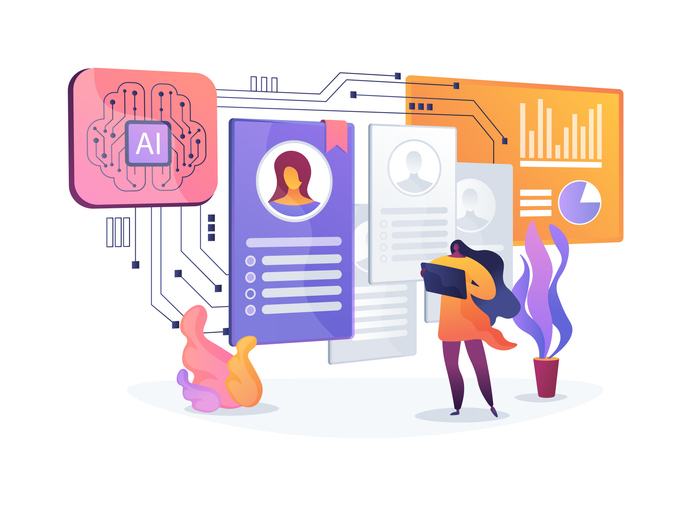For CEOs and HR leaders, hiring top talent has never been more competitive. Traditional recruitment methods are often slow, costly, and prone to human bias. Enter artificial intelligence (AI): a game-changing tool that is transforming how organizations source, evaluate, and onboard employees. By streamlining both hiring and onboarding, AI not only reduces inefficiencies but also creates smoother first impressions that boost retention. Businesses leveraging AI can improve candidate experiences and ultimately build stronger, high-performing teams. According to McKinsey & Company, companies that adopt AI in talent acquisition can cut hiring times by up to 30% while significantly increasing quality-of-hire. This guide explores how to leverage AI effectively while also considering the ethical questions that come with its rise.
How to Leverage AI in Recruiting?
AI is not here to replace recruiters — it’s here to empower them. The most effective organizations use AI to augment decision-making and streamline repetitive processes. For instance, AI-driven platforms can scan thousands of applications in seconds, flagging the candidates that most closely match the job description.
AI can also help optimize job postings themselves. By analyzing performance data, AI tools recommend the language and structure most likely to attract top-tier candidates. This is particularly valuable when writing job descriptions that stand out in a crowded market. As UK Recruiter reports, AI-driven agents are already automating candidate outreach and scheduling, freeing up recruiters to focus on relationship-building and strategy.
How Is AI Being Used in the Hiring Process?
AI is now present at nearly every stage of the recruitment funnel:
-
Candidate sourcing: AI scans social platforms, professional networks, and job boards to find potential applicants who may not be actively searching.
-
Screening and assessment: Natural language processing (NLP) tools analyze résumés, cover letters, and even recorded interviews to assess skills, tone, and cultural alignment.
-
Interview preparation: Some platforms generate tailored interview questions based on the role and desired competencies — helping leaders uncover qualities like leadership potential and problem-solving ability.
-
Onboarding support: Once a candidate accepts, AI can guide them through the onboarding checklist with personalized workflows, ensuring nothing is missed in their first 90 days.
As Harvard Business Review notes, the impact is clear: companies using AI to enhance recruitment report stronger candidate engagement and faster integration into teams.
How Does AI Help the HR Team to Streamline Candidate Sourcing?
Traditional candidate sourcing is labor-intensive, often involving hours of LinkedIn searches or scanning CV databases. AI revolutionizes this process by:
-
Identifying passive candidates: Algorithms surface talent that matches your criteria but hasn’t applied yet. This widens your funnel to include high-quality professionals you might otherwise miss.
-
Ranking candidates by fit: Rather than overwhelming HR teams with hundreds of applicants, AI ranks them by relevance and probability of success, improving productivity and cutting screening time.
-
Reducing bias: Properly trained AI systems remove identifying details (like names or demographics) during screening, focusing solely on skills and experience. This supports diversity and inclusion goals.
In other words, AI allows HR leaders to spend less time buried in résumés and more time assessing culture add versus culture fit, ensuring new hires truly contribute to long-term business growth.
Is It Ethical to Use AI in the Hiring Process?
The benefits of AI are compelling, but ethical considerations cannot be ignored. Concerns include:
-
Bias in algorithms: If AI systems are trained on biased historical data, they can unintentionally replicate or even amplify discrimination.
-
Transparency: Candidates may feel uncomfortable if they aren’t aware an algorithm is screening them.
-
Human oversight: Relying solely on AI removes the human judgment needed to assess nuance, creativity, or potential.
According to SHRM, the most responsible employers adopt a hybrid approach, using AI for efficiency while ensuring that final hiring decisions remain with human recruiters and managers. Transparency with candidates about how AI is used builds trust and reinforces your employer brand.
Conclusion
AI is reshaping the future of hiring. From crafting compelling job descriptions to managing candidate pipelines and reducing hiring risks, it is an indispensable tool for CEOs who want to attract and retain top-tier talent. But success requires balance: leverage AI for efficiency, maintain human oversight for fairness, and keep ethics at the core of every decision.
For leaders committed to building high-performing teams, the message is clear: those who embrace AI in recruitment will not only save time and money but also gain a decisive advantage in the war for talent.














